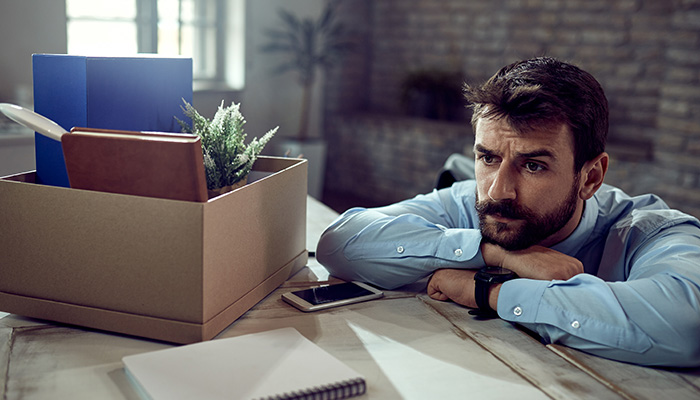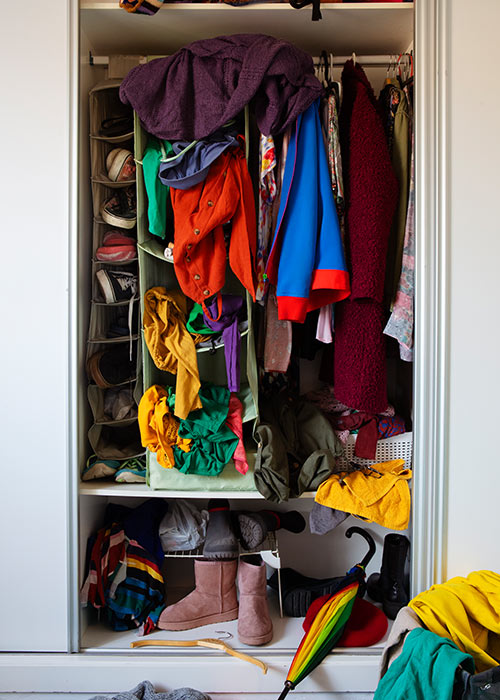Imagine opening an overlooked cupboard or rummaging through a dusty attic, only to be confronted with years of accumulated belongings you’d completely forgotten about. But the joy of rediscovering lost treasures quickly fades when you realize the extent of clutter you’ve amassed.
The saying “out of sight, out of mind” perfectly captures the false sense of relief that comes with hiding things away because these neglected items don’t really disappear. Instead, they build up and create invisible burdens that weigh on our physical, emotional, and mental well-being.
Learn more: 21 Outdoor Shed Organization & Storage Ideas to Help You Declutter
Conquer Clutter: Reclaim Your Space
We’ll explore how neglected belongings, whether tucked away in the hopes of achieving a minimalist aesthetic or simply ignored and forgotten about, can haunt your home and weigh on your mind.
What’s more, we will provide tips on how you can overcome household clutter and get back to an organized space in no time.
From Door to Storage, We’ve Got You—Experience the Easiest Move Ever!
3 Tips On Getting Rid Of All Neglected Junk From Your Home
1. Physical Consequences Of A Disordered Home

Neglected belongings don’t just clutter your mind—they also physically clutter up your home. Forgotten boxes of kids’ toys, unused furniture, and disorganized piles of clothes can create physical disarray, making it harder to keep your living space tidy and functional. Every drawer, shelf, or storage nook that fills up with forgotten items reduces your home’s usable space.
Worse yet, any neglected areas and items can quickly become magnets for dust, mold, or pests, resulting in problems, and health issues like allergies and asthma. This is especially true in attics and basements where the lack of airflow or regular cleaning schedules can lead to respiratory issues or even safety risks from trip hazards and blocked fire exits.
Learn more: Can Technology Help To Declutter Paperwork?
2. The Avoidance Technique

One reason we tend to ignore unused items and hide them away is the convenience of not having to face sorting them out. It’s a lot easier, less time-consuming, and more convenient to throw clutter and disused items into cupboards, wardrobes, attics, and basements. You may even have secured items away in your garage or a shed in your yard rather than confront the task of sorting through it.
Psychologically, the avoidance technique provides nothing more than a temporary escape from the stress of decision-making and decluttering. However, neglecting these items doesn’t address the underlying problem of making you worry about when you’ll finally get around to sorting them out.
Learn more: How to Declutter Your Room – 6 Ways to Declutter Your Bedroom
Add in the emotional attachments that you might have to certain possessions, and it’s easy to see how you can procrastinate and let the issue pile up. You may avoid dealing with clutter to avoid the emotional discomfort of getting rid of things, but their presence still lingers, creating low-level anxiety.
3. Financial Costs To Consider

There’s a financial cost to keeping items unused and stored away. When our belongings are forgotten or misplaced, it’s all too easy for their value to be lost. Whether it’s tech, fitness equipment, jewelry, or designer handbags and shoes, the money you’ve spent on these pieces goes to waste if they sit gathering dust. They could be sold on, repurposed, or enjoyed by someone else, but instead, they sit taking up valuable room in your home.
In addition to missed earning potential, it’s easy to find yourself buying duplicates of things you already own because you either can’t find them among the mess or because you’ve simply forgotten what you have. It’s an unnecessary cost both in terms of your money and resources.
6 Ways To Tackle Clutter In The Home

1. Start Small and Tackle One Room at a Time
Decluttering can feel overwhelming, so begin by focusing on one room at a time. Trying to organize the entire home at once can lead to chaos and make you want to give up. Break down each room into sections, such as a single cupboard or drawer, and spread the task over several weeks for a manageable approach.
2. Sort Items into Categories
Organize your belongings into four categories: keep, sell, donate, or discard. Be honest about what you really need. If you haven’t used an item in over a year and it holds no sentimental value, it may be time to part ways with it.
Learn more: How to Teach Kids to Declutter: Easy Tips for Parent
3. Maximize Space Efficiency
Ensure daily-use items are easily accessible, while things used less often can be stored in less prominent places. Consider how your space is used and where efficiency can be improved for a more functional home.
4. Use Storage Solutions for Seasonal or Sentimental Items
For items like seasonal gear or sentimental keepsakes that you don’t use daily but want to keep, storage solutions are ideal. With options like an online photo catalog, you can easily browse your belongings and have them delivered whenever you need them.
From Door to Storage, We’ve Got You—Experience the Easiest Move Ever!
5. Revisit Clutter Regularly
It’s important to sort through clutter periodically to ensure it doesn’t become overwhelming. Ignored items can have hidden costs—mentally and financially—so addressing clutter regularly helps maintain a peaceful, organized home.
6. Clutter’s Customized Solutions
At Clutter, we offer flexible, affordable storage and moving services to help you manage your belongings and reclaim your space. Contact us today for a quote!
Conclusion
Clutter can silently build up, both physically and mentally, weighing down your home and your well-being. By taking a proactive approach—starting small, categorizing items, and embracing storage solutions—you can reclaim your space and alleviate the invisible burdens that clutter creates. Regularly revisiting your belongings helps ensure they remain purposeful and prevents the chaos of accumulated possessions. Remember, clearing out neglected items isn’t just about tidying up your space, but also about creating a more peaceful and functional home environment. Whether you need help moving or storing those items, Clutter offers solutions tailored to your needs, making the process of decluttering easier than ever.








